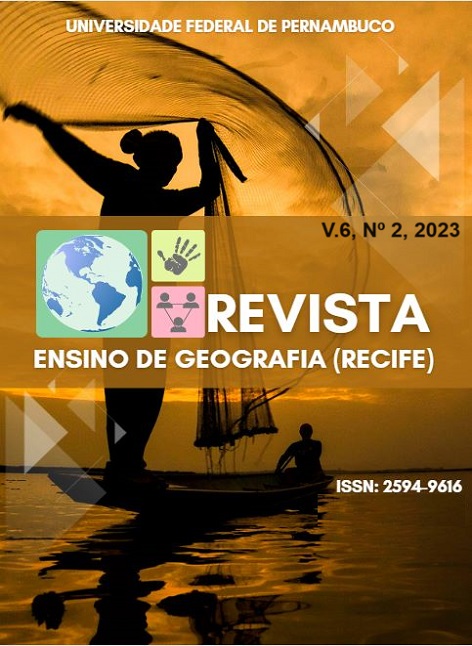Soil education through the flipped classroom: an experience during the COVID-19 pandemic
DOI:
https://doi.org/10.51359/2594-9616.2023.256607Keywords:
soils, active methodology, flipped classroom, following teachingAbstract
The over-exploitation of natural resources has had a direct impact on the expansion of environmental degradation processes. Among the resources affected by the destructive processes is the soil. In this sense, and given the importance of soil for the maintenance of life, it is necessary to significantly develop teaching about it at school. The objective of this work was to develop a didactic sequence (SD) in the 6th year of Elementary School at Colégio Estadual Josué Passos - Ribeirópolis/SE, on soil contents using the Active Methodology, Inverted Classroom. As main results, through the application of a questionnaire, it was found that the knowledge of the students about soil is strongly linked to the use of it for planting, implying the need for practices that lead to a deeper learning. The inversion of the classroom carried out through the didactic sequence presented positive results regarding the participation of the students during the synchronous moment, perceived through the questions, curiosities, discussions and engagement, in this way, it is expected to have expanded knowledge on the subject, contributing thus in disseminating and raising awareness about the sustainable use of this resource.
References
BARBOSA NETO, Manuella Vieira. Qualidade do solo em área vulnerável à desertificação no semiárido pernambucano. Tese (Doutorado em Geografia) – Universidade Federal de Pernambuco, CFCH, Programa de Pós-Graduação em Geografia. Recife, 2016. 142p. Disponível em: https://repositorio.ufpe.br/handle/123456789/23442. Acesso em: 22 set. 2020.
FLICK, Uwe. Desenho da pesquisa qualitativa. Roberto Cataldo Costa (trad.), Dirceu da Silva (rev. téc.). Porto Alegre: Artmed, 2009.
FREIRE, Paulo. Pedagogia da autonomia: saberes necessários à prática educativa. 62ª ed. Rio de Janeiro/São Paulo: Paz e Terra, 2019.
FREIRE, Paulo. Pedagogia do oprimido. 74ª. ed. Rio de Janeiro/São Paulo: Paz e Terra, 2020.
LEPSCH, Igo Fernando. Formação e conservação dos solos. 2ª ed. São Paulo: Oficina de Textos, 2010.
LEPSCH, Igo Fernando. 19 lições de Pedologia. São Paulo: Oficina de Textos, 2011.
LIMA, Marcelo Ricardo de. Perfil e morfologia do solo. In. Conhecendo os solos: abordagem para educadores do ensino fundamental na modalidade à distância. Universidade Federal do Paraná. Departamento de Solos e Engenharia Agrícola; Curitiba: Departamento de Solos e Engenharia Agrícola, 2014, p.51-66. Disponível Em: http://www.escola.agrarias.ufpr.br/arquivospdf/livro_ead.pdf. Acesso em: 12 de julho de 2020.
MORAN, José. Metodologias ativas para uma aprendizagem mais profunda. In: BACICH, Lilian; MORAN, José (org.). Metodologias ativas para uma educação inovadora: uma abordagem teórico-prática. Porto Alegre: Penso, 2018, p. 1-25.
MUGGLER, Cristine Carole et al. Capacitação de Professores do Ensino Fundamental e Médio em Conteúdos e Métodos em Solos e Meio Ambiente. Anais do 2º Congresso Brasileiro de Extensão Universitária, Belo Horizonte, set. 2004. Disponível em: https://www.ufmg.br/congrext/Meio/Meio51.pdf. Acesso em 22 de julho de 2020.
MUGGLER, Cristine Carole; PINTO SOBRINHO, Fábio de Araújo; MACHADO, Vinícius Azevedo. Educação em solos: princípios, teoria e métodos. Revista Brasileira Ciência do Solo, v.30, p.733-740, 2006. Disponível em:https://www.scielo.br/pdf/rbcs/v30n4/14.pdf>. Acesso em: 22 de julho de 2020.
SANTOS, Humberto Gonçalves dos et al. Sistema brasileiro de classificação de solos. 5ª. ed. Brasília, DF : Embrapa, 2018. v. 1. 356p. Disponível em: https://www.infoteca.cnptia.embrapa.br/infoteca/handle/doc/1094003. Acesso em: 21 jul. 2020.
SARAIVA, Karla; TRAVERSINI, Clarice; LOCKMANN, Kamila. A educação em tempos de COVID-19: ensino remoto e exaustão docente. Práxis Educativa, Ponta Grossa, v. 15, p. 1-24, 2020. Disponível em: https://revistas2.uepg.br/index.php/praxiseducativa/article/view/16289. Acesso em: 05 de fevereiro de 2022.
ZABALA, Antoni. A prática educativa: como ensinar. Ernani F. da F. Rosa (trad.). Porto Alegre: ArtMed, 1998.
Downloads
Published
How to Cite
Issue
Section
License
Copyright (c) 2023 Angélica Oliveira de Almeida, Cristiano Aprígio dos Santos

This work is licensed under a Creative Commons Attribution 4.0 International License.
Authors who publish with this journal agree to the following terms:- Authors retain copyright and grant the REVISTA ENSINO DE GEOGRAFIA (RECIFE) right of first publication with the work simultaneously licensed under a Creative Commons Attribution NonCommercial International 4.0 (CC BY-NC) that allows others to share the work with an acknowledgement of the work's authorship and initial publication in this journal.
- Authors are able to enter into separate, additional contractual arrangements for the non-exclusive distribution of the journal's published version of the work (e.g., post it to an institutional repository or publish it in a book), with an acknowledgement of its initial publication in this journal.
- Authors are permitted and encouraged to post their work online (e.g., in institutional repositories or on their website) prior to and during the submission process, as it can lead to productive exchanges, as well as earlier and greater citation of published work.



